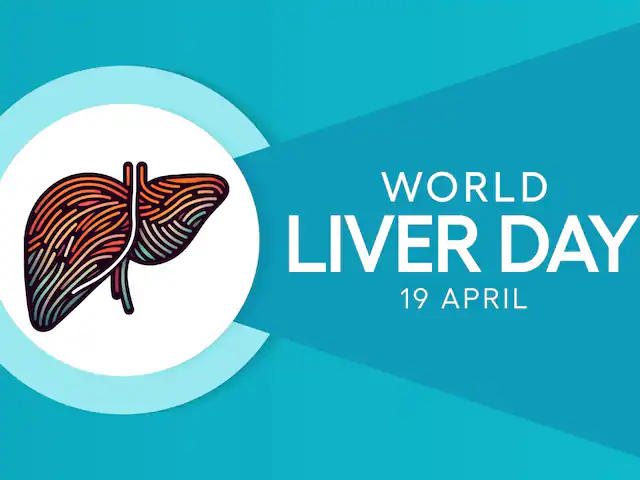World Liver Day 2024: Dietary Advice, Prevention, Symptoms, and Causes!
Every year on April 19, the world observes World Liver Day to bring attention to liver illnesses and to emphasize the vital function the liver plays in immunity, metabolism, and digestion. The World Health Organization (WHO) lists liver illnesses as one of the top 10 causes of mortality in India. It’s critical to comprehend the origins, signs, precautions, and therapies of liver disorders in order to preserve liver health.

“The key is education, early detection, and care.”
Most physical ailments and problems are easily detected because they manifest themselves right away; however, liver problems usually do not manifest themselves until much later in the disease process, by which point they frequently necessitate transplantation and surgery, and, in the worst cases, are fatal. According to Dr. Naveen Ganjoo, a consultant hepatologist with the Aster Integrated Liver Care program at the Aster RV hospital in Bengaluru, “people don’t realize the dangers of a liver disease until it’s too late because the liver can function even when 70% is damaged.”
Individuals may take proactive actions to protect their well-being and lessen the burden of liver illnesses by promoting preventative measures and increasing knowledge of the significance of liver health. Dr. Ganjoo said, “We can work toward a future where liver diseases are effectively managed and lives are saved through education, early detection, and comprehensive care initiatives.”
Five Guidelines for a Healthy Liver
Dr. Naveen Ganjoo suggests a few crucial lifestyle changes and preventative steps to support liver health.
consuming a nutritious, well-balanced diet.
regular exercise on a daily basis.
Checking for Band C hepatitis. If identified early, both illnesses are treatable.
Obtain the Hepatitis B vaccination if the results are negative.
Make sure to use disposable needles for injections and tests when you visit a hospital.
Symptoms for World Liver Day in 2024
Your body may alert you to the possibility of a liver-related illness via a variety of symptoms that should not be disregarded. Liver disease may be avoided if two or more symptoms are present and prompt medical treatment is received.
swelling around the ankles and legs
Red, itchy skin around the stomach
appetite decline
stomach ache
emesis
throwing up
High temperature
Slight jaundice
Color of urine
Stool with blood, etc.
World Liver Day 2024: Reasons for Consuming Alcohol
The main cause of liver damage, which may result in diseases including fatty liver disease, cirrhosis, and liver cancer, is excessive alcohol intake.
Hepatitis virus
The most prevalent forms of viral hepatitis are A, B, and C, which are spread via tainted food, drink, body fluids, or mother-to-child contact after delivery.
Drugs
Acetaminophen, statins, and antibiotics are a few drugs and supplements that might damage the liver, particularly if used for an extended period of time.
Molecular Biology
Because genetic variables affect how the body stores and metabolizes fat, they may raise the risk of liver problems. Liver damage may result from these conditions, causing the liver to accumulate excessive amounts of protein, iron, or copper.
Being overweight
Liver disease is more likely in those who are obese or have extra body fat overall. Non-alcoholic fatty liver disease (NAFLD) is a disorder that may develop when too much fat builds up in the liver over an extended period of time. NAFLD may result in inflammation, liver failure, and liver scarring.
World Liver Day 2024: Take Precautions
Even while maintaining liver health and preventing liver disease become more challenging after an illness has set in, there are a few easy steps you can take to help:
Sustain a Healthy Weight
An important risk factor for non-alcoholic fatty liver disease is obesity. The risk may be greatly decreased by maintaining a healthy weight with a balanced diet and frequent exercise.
Steer clear of unhealthy foods
To prevent developing fatty liver disease, concentrate on eating foods that are good for the liver, such as fruits, leafy green vegetables, lean meats, and whole grains. Avoid high-saturated diets and trans fats.
Reduce Your Alcohol Consumption
To maintain the health of your liver, try not to binge drink since this causes dehydration and makes it more difficult for the liver to eliminate toxins from the body, which may result in liver disease.
Immunization
Obtain a Hepatitis A and B vaccination to safeguard the health of your liver.
Continue to practice proper hygiene.
Avoid coming into contact with bodily fluids that are contaminated to avoid contracting the hepatitis virus, and wash your hands often to stop the spread of hepatitis A.
2024’s World Liver Day: Treatment
The degree and particular etiology of liver disease determine the course of treatment. Treatments for some liver issues include dietary adjustments, weight loss, and abstaining from alcohol. Medication may be used to address further liver issues. Nonetheless, a liver transplant can be required in extreme circumstances with significant liver damage.
World Liver Day 2024: Nutritional Advice To Preserve Liver Health
To keep your liver healthy, you must consume a balanced diet and have a healthy lifestyle. Regular exercise is also crucial for preventing conditions including cirrhosis, hepatitis, and liver cancer. Here are a few easy ways to maintain the health of your liver:
Pay attention to whole grains, rice, quinoa, millet, and buckwheat cereals, as well as fruits and vegetables.
It is advised to incorporate green leafy vegetables in one’s diet, such as apples, walnuts, broccoli, cauliflower, and cabbage.
Eat the juice of lemons and limes.
Drink green tea instead of milk tea.
Instead of using fatty oils, use olive oil.







